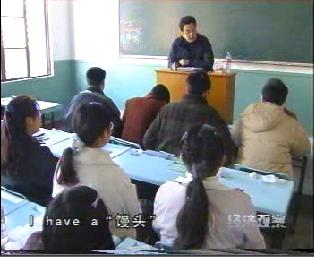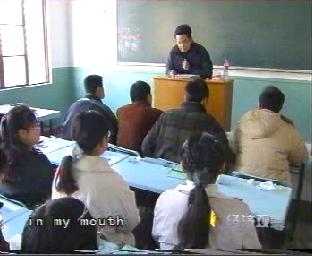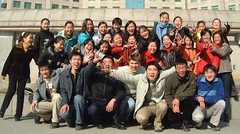21
Mar 2003A Semester in Review
I’m here in China to get really good at Mandarin Chinese. Fortunately, I also enjoy teaching English, since I’ve been doing it for going on three years now. I’m really interested in applied linguistics, so to me teaching is more than just a source of income. It’s research. (Warning to the short of attention span: the following long post is going to be solely about teaching English in China.)
At the end of each semester, I always evaluate how the semester went. Did my students learn anything? Did I stimulate their interest as well (in other words, was class interesting)? Are they likely to remember anything I taught them that semester? Did the grades I gave really reflect the increase in their spoken English proficiency?
These are some hard questions, ones that I think many casual backpacker English teacher types don’t give a second thought to. It’s understandable, if they’re only going to be in China for one or two semesters. But I really care about these answers, personally and intellectually. To help me answer these types of questions about my classes, each semester I have my students answer an anonymous questionnaire in class. I use the results when making decisions about how to modify my class for the next semester.
Last semester class grading was mostly discussion-based, although there were only 5 iscussions. Discussions were student-led. Student discussion leaders also had the responsibility of coming up with their own thought-provoking discussion questions.
The following are the questions I asked my students and some of the answers I received (in the students’ own words, mistakes and all).
1. What did we not do enough of in class?
- watch movies
- play more games
- we should have class outside
- We didn’t talk enough to you!
I was surprised that a lot of students felt that they didn’t have enough direct interaction with me. I strive not to be one of those “spoken English teachers” that just talks the whole class. If the students are to improve their speaking ability, they must do the talking in class. Maybe I overdid it though? It’s the first time I ever got that remark, and I got it from quite a few different students.
More movies and class outside are typical suggestions, but they can only be practically realized (and justified) to a very limited extent.
2. What did we do too much of in class?
- Laughing
- We made too much jok
- I think some of the discussions are very good, but some are meaningless. We can’t improve our Oral English speaking ability by discussions. We learn little things, maybe none.
- The class is all about discussion, it is boring.
The last two comments are the kind I take seriously. The only problem is, from a linguistic standpoint, very often the students have absolutely no idea what they’re talking about. Students who don’t like discussions often propose more one-on-one interaction with me. In a class full of students, however, that’s just not practical. I have to go by the wisdom I learned at UF’s ELI: “divide the class, multiply the talking.” That means they interact with each other more than me. But it gives them more speaking practice.
The complaint about too much discussion is just ludicrous. I think five 30-minute discussions, spread out over 16 weeks of class, hardly qualifies as overdoing it.
3. What did you like about the discussions?
- They’re always interesting.
- Great, wonderful, interesting.
- Through the discussions, some unfamiliar classmates become familiar.
- The topic is usually very interesting so most of us like it. we learn new and good ideas from others at once our English are improved. It’s helpful.
Here a problem with the questionnaires becomes apparent. The students’ feedback is often completely contradictory! When my ideas are based on sound linguistic principles and legitimate pedagogy, though, I tend to listen more to the positive feedback than the whiners.
4. What did you dislike about the discussions?
- I dislike the discussions which are boring and tedious.
- I don’t have enough time to talk with our dear John.
- We don’t know whether our sentences are correct.
- For example sex. I think it is not good for us.
- We are too young to say such sexy topic.
Complaints about class being boring are typical. Many students expect foreign teachers to be singing dancing game-playing clown entertainers (and some of them do fit the bill). Compared to most of their other classes, just about any spoken English class is a nice breath of fresh air for Chinese students, but they still complain.
The sex complaint is an interesting one, because I debated myself whether I should devote a discussion to the topic of sex. It went really well, though.
5. Any other comments?
- No other comments, the class is much more interesting and funny than other courses.
- Actually I like your class best. Because it is very interesting. And you are a very good teacher.
- The atmosphere is too serious espaciouly when we have oral quiz. You shouldn’t be so rigid on the examination and the scores.
- We should not have examination.
- You’re an awesome guy. : )
- I think you are very handsome, also a good teacher.
- John is a good teacher. warmly and kind-heart. Oral English lesson is active class. But the class time is too short.
- You are the best teacher and very lively.
- The class has a little boiling so I want teacher to make it more interesting. Can have class outside and play much.
- On the whole, John’s classes are interesting and lively, full of excitement and joy. We have been looking forward to Friday and your classes.
- You are a lively teacher, I like your style. Could you communicate with us after class, We could talk more and discuss. I think that would improve our English level greatly.
- I can’t understand why you forbade us to speak Chinese you know, sometimes speak Chinese will make thing more comfortable some words we must speak Chinese to express ourselves. It is true that in English class English is the language we should speak, but Chinese is also useful. So I hope you will not forbade us to speak Chinese next term.
- This course is useful and I like it very much. : )
- I think the class doesn’t do much to improve my English.
- Useful English, not useless playing.
- I love you.
OK, so I never said I couldn’t use my own blog to boost my ego. Hehe… Sometimes students can leave harsh comments, so all the positives provide a nice balance. Again, there’s so much conflicting feedback, but I think doing questionnaires is definitely worthwhile. I highly recommend it to any TEFL teachers who are trying to improve their teaching methods.
14
Mar 2003Friends and Pics
In the past I have done a little introductory mug shot page for the English-teaching foreign teachers here at ZUCC. This semester Wilson did it. It’s hosted on his site, but since his site is blocked in China and mine isn’t, it’s also mirrored on my site. Check it out! I’m sure I’ll be mentioning these people on here in the future.
During his time here, Wilson has gotten really imaginative with his photography and web design. I envy his creative eye, his Photoshop skills, his awesome camera. Even if these talents don’t rub off on me, though, at least I can enjoy his results. Don’t miss: Jade Emperor’s Hill [mirrored], Viewing Fish at Flower Pond [mirrored].
I mentioned recently that I’ll be on TV in China March 22nd. Being on TV is a pretty common occurrence for foreigners living in China. Frequent readers/commenters of this blog will be familiar with my friend Ray. He was on TV in Shanghai some months ago when he still worked there. They did a bit of a bio on him. Anyway, he sent me some vidcaps of his 10 minutes of glory, and I think they’re pretty funny, so I’m sharing them. I don’t think he’ll mind everyone having a look at his studly countenance. If he ever put up a site of his own, I’m sure he’d put these pics up.

“So I want to write a book, right? …”

(That’s mantou, a kind of Chinese bun.)

What a fascinating lesson, eh? The students are riveted!
Speaking of commenters on Sinosplice, “Prince Roy,” a rather new regular commenter here, now has his own blog too. Check it.
10
Mar 2003You gave your life…
> You gave your life to become the person you are right now.
Was it worth it? –Richard Bach
Few quotes get me thinking these days like this one did. It’s easy to blow it off without pondering it, but I found it a very worthwhile rumination.
I found the quote in a blog called imo. Interestingly, two of the four quotes on that page are also on my quotes page. (Not the one above, though.) Good quotes.

I became familiar with Richard Bach in high school. I found Jonathan Livingston Seagull rather forgettable, but I loved Illusions: the Adventures of a Reluctant Messiah. Truly high-octane fuel for the imagination.
It’s often said nowadays that where creativity is concerned, China is a huge gaping void. What has China invented lately? Even books like Richard Bach’s seem to echo the philosophies of a China of lore — so distant, but certain as last night’s forgotten dream. Sure, joining the WTO is good times and fun for all, but in modern China, how can even the will of 1.3 billion parched minds revive creativity’s corpse?
05
Mar 2003Rensheng AB Ju
Yeah, I’m not even going to try to translate this one. Rensheng AB Ju is the name of a television show here in Zhejiang. On this show the beginning of a story is told by video to the audience, then stopped, and the watchers are given two choices: A and B. Which should the person take? The three guests (usually of minor fame) are then asked by the host which choice they think is best and why. After that a few guests from the studio audience are asked their opinions. Then the story continues to the next juncture, another A/B choice is presented, and so on. (For the Chinese-inclined, here’s an introduction in Chinese.)
I bring this show up not because I like it (I’ve actually never seen it), but because I was on it. Filmed it last Tuesday. I was a little nervous about being on the show. It was all in Chinese, of course. What if I didn’t follow the story completely, or what if the discussion took a difficult turn? I’d rather not look dumb on TV, if possible. The man on my left was a psychologist (I think) and professor at Zhejiang University, and the woman on my right was an author. My sole qualification was being a foreign teacher in China. The topic was one particular woman’s extra-marital affair.
The show actually went pretty well, I think. I understood pretty much everything, and the host was very easy-going and easy to understand. The psychologist guy busted into some pretty esoteric stuff now and then, dropping all sorts of chengyu, and at those points I was always afraid they would turn to me and ask, “and what do you think about that?!” but that didn’t happen. I talked less than the other two, but that’s pretty understandable. What I did say I communicated well enough.
The show airs on the Zhejiang Satellite TV Station (Zhejiang Dianshitai Weixing Dianshi), Saturday, March 22nd, 9:45pm, and then again Sunday, March 23rd, 11:40am and 3:52pm. This is the fourth time I’ll be on TV in China, I think, and this time instead of chancing into it they came looking for me. Interesting stuff happens to you when you’re here long enough…
05
Mar 2003浙大第三
我来中国以来一直很想知道在中国大学其中哪些大学最好。最近Chuck的blog有答案。是这样:
1. 清华大学(北京)
2. 北京大学(北京)
3. 浙江大学(杭州)
4. 复旦大学(上海)
5. 华中科技大学(武汉)
6. 南京大学(南京)
7. 武汉大学(武汉)
8. 吉林大学(长春)
9. 上海交通大学(上海)
10. 中山大学(广东)
哇,浙大是第三名!不错。以前我跟我的朋友雷雷讨论过这个问题:浙江大学好还是南京大学好?雷雷总是说在各个方面南京比杭州好,包括大学。我都不理他因为杭州没有他说的那么差劲。我才有办法向他证明在这个方面杭州好。
我觉得有意思的是中国北方人老以为北方比南方有文化。那么为什么在中国最优秀的大学其中北方只有三个呢?我不得不承认北京是有中国最好的两个大学,但我还 以为北方应该有更多的。对这个问题我特别有兴趣因为下个学期我想再当学生,很认真地学中文。到现在我在中国从来没有上过中文课。对我来说好象自学的进步是 有限的,我想再上学的时间到了。所以我要考虑去哪里上中文课比较好呢?我知道北京的大学最好,最有名,那边的普通话最标准。可是我真的不想住在北方,也不 想学北方的口音。还好南方有这么多好大学。
02
Mar 2003New semester, New music
> head like an empty sterile room, somehow I made a mess
like watching newborn babies crack from work-related stress
-Alkaline Trio, “I lied my face off”

Well, it’s the beginning of the semester, a fresh start. New students, new teachers, new lesson plans… Somehow it all seems a little “messy” though. I wonder if it’s because of the constant rain. We actually had nice weather today, but that’s a rarity. The other day I accidentally said “rain forecast” instead of “weather forecast.” Hangzhou winters are like this. Lots of time spent indoors. I’m looking forward to the spring…
Lately I can’t stop listening to this song. This one and this one aren’t bad either. I’m not exposed to a lot of new music these days, so when I find something new I like, I’m all over it. I have access to internet radio, but it usually spews the same garbage across the internet as it does across the airwaves at home. I’m happy I found Dashnine Radio. Rarely have I found a station that plays so much stuff I like. Atom and His Package, Screeching Weasel, and The Transplants, all on the same station? I’m there.
[Note: These MP3’s will be online for a limited time only, so if the links have gone dead, that’s why. To see what music I’ve got online at any given time, go to www.sinosplice.com/music/.]
28
Feb 2003"China – The Real Facts"
[Lifted from Dave’s ESL Cafe. Non-italicized, non-indented comments by me.]So, you’re thinking of coming here to teach. Know this advance.
1) With some rare exceptions, your salary at 90% of schools will be no more that $500 US dollars a month, if that. Many schools pay far less than this. China is a poor country. Your accomodation is likely to be on par with what the Chinese themselves would have – a real shocker, by any standards.
This is mostly true. Pay is that low. Accomodations, however, can sometimes turn out to be “a real shocker” for the opposite reason. This was true for me, Wilson, and Jay Peterson (a guy I met in Yunnan).
2) Outside of the modern cities, the Chinese have disgusting personal habits and most provincial cities are filthy shitholes. The Chinese (men and women) spit everywhere and constantly. They piss on the streets and I have seen them shit behind walls. Unless you have a very strong stomach, you may find yourself throwing up. I am not making this up, by the way.
OK, this is based in truth, but it seems exaggerated. You do see public urination a few times a month if you go out, but I have yet to see public defecation.
3) By western standards, they have no ‘manners’. They push and shove. They scream ‘Hello’ at you, snigger and then run away. They stand behind you in Internet cafes – groups of them – and watch your screen. They have no concept of privacy.
Once again, based in truth, but garnished with a liberal helping of culture shock, it seems. Still, the pushing and linelessness is definitely hard to get used to.
4) North of Guanzhou (ie: 90% of China), prepare for savagely cold winters and blisteringly hot summers, untempered by humidity).
Pre-Yunnan me actually wondered if anywhere in China actually had pretty good weather year-round. Now I know.
The people are basically very kind and friendly, but not in a reserved, western way. This is a great country to experience ‘life’, but bear in mind what I’ve said. Personally, I can deal with the downside and am enjoying my experience, but many would not. Nothing personal, but my remarks are objective and I hope, helpful.
Posted: February 19, 2003
I think this is post is a good demonstration that there’s no such thing as objective remarks on China, but it’s a good read and certainly represents how a decent-sized portion of the West would view China.
26
Feb 2003怪物眼睛
 中国人,我求你们–不要买彩色隐形眼镜!!!你看这个照片。好看吗?当然不好看!好看个屁!我觉得亚洲人染头发偶尔会好看。但彩色隐形眼镜呢?不可能!我还是觉得自然的颜色最好看。
中国人,我求你们–不要买彩色隐形眼镜!!!你看这个照片。好看吗?当然不好看!好看个屁!我觉得亚洲人染头发偶尔会好看。但彩色隐形眼镜呢?不可能!我还是觉得自然的颜色最好看。
有时候中国人会问我:“为什么你没有蓝眼睛?”好象他们以为因为我的头发是黄色(其实也不是黄色…),我的眼睛也应该是蓝色。但我这样是天生的。我才不要 蓝眼睛!棕色最好看,给你一种温柔的感觉。蓝眼睛好看是好看,但给你一种冷清的感觉!中国人应该很高兴他们都有天然的最好看的颜色眼睛。反正我很高兴我有 棕色眼睛。
我也
染过头发,但我还是觉得天然的颜色好。(人家也这么说。)
21
Feb 2003Random News
Man, lately I’ve been bad about responding to any e-mails, writing in my blog, and reading anyone’s blog. I also have tons of pictures from Yunnan that I want to get online. (Despite my whining, I actually took a lot of pictures, and a lot of them are decent.) But the school semester starts Monday, and my new job as ZUCC foreign teacher liaison has already begun. I’ve been running around today doing stuff for that, and I’m going to the airport tomorrow to meet one of the new teachers. In addition, there are a few other things I’m really happy about this semester: (1) I only teach 14 hours, (2) I have no classes Fridays or Tuesdays, (3) my largest class size is about 22 now, as my 30 student classes have been split in half (at my repeated urging). Same amount of class time for each student, but less students per class. That means class is easier to teach, and the students get more out of class. Having lots of foreign English teachers (12 total this semester) is a very good thing.
Alf was here in Hangzhou for a visit Tuesday and Wednesday. Unfortunately winter is not the best time of year to witness “the beauty of Hangzhou,” but we had a pretty good time anyway. It was pretty funny how whenever he told Chinese people here that he’s teaching in Henan province, they were all like, “Henan?! Why are you teaching there? It’s a dirty place full of thieves!” Alf doesn’t exactly agree, but to get one guy off his back, he explained that he came here through a program and he didn’t have a choice. “Oh,” the guy said. And then, in English, “bad luck!”
Noriko, one of the Japanese teachers here, invited me over for dinner tonight. She’s really cool and sweet, and a good cook besides. What I didn’t realize was that it was an all-Japanese gathering, besides me. So my Japanese got a healthy 4-hour workout. The conversation went all over the place (and I admit I was a bit distracted at times, especially since she had, for some reason, left a movie of the stunning Norika Fujiwara running in the background), but they touched on quite a few interesting things, like wedding customs and costs, Chinese students’ obsession with insignificant features of Japanese pronunciation, and what nationality they were often taken for in China. Noriko said Chinese people were always shocked to learn she’s not Chinese (because she “looks so Chinese”), and usually make a comment like, “well, you’re definitely not Japanese, so what are you, Korean?” Apparently the Chinese often ask Japanese people if they are Korean. What I couldn’t say was that perhaps they always guess Korean because Koreans might be offended if they’re taken for Japanese (and the Chinese would be sensitive to that), while the reverse is not true.
Anyway, Yunnan photos are coming. (And e-mails, to some of you.)
18
Feb 2003Dashan
Ray posted a nice long comment to my last entry. Unfortunately, Haloscan seems to have lost it. [Update: the “lost” comments are back.] One thing he touched on, though, was “that big dork Dashan.” Dashan is pretty much completely unknown outside of China, but almost universally known within China. This man has become a real nuisance to students of Chinese everywhere.
Dashan is a big white Canadian. The thing is, he speaks Mandarin Chinese perfectly. I mean really, really well. He basically decided, “yeah, I’ll take on Chinese,” and then just competely kicked Chinese’s ass. He has done xiangsheng for years, a kind of two-person traditional Chinese standup comedy. “Dashan” means “big mountain,” which I always thought was an incredibly stupid Chinese name, but then a Chinese friend explained to me that it’s sort of a joke, and that Chinese people like the name. Ah, Dashan… you win again, with your superior understanding of Chinese “humor” (which really is unfathomable)!
According to the chronology on Dashan’s site, he majored in Chinese studies, graduated in 1988, and has been in China ever since. He was in an independent studies program at Beijing University, and he also served as a public relations advisor at the Canadian Embassy in Beijing. The hilarious conclusion to the chronology: 1995 – Founded Dashan Incorporated and began full-time career as Dashan. OK, I don’t know whether it’s just me, or it’s a foreigner-in-china thing, but I find that very funny.
OK, so you’re probably wondering what the deal with Dashan is. Why am I bringing him up? Well, there are several reasons. First, he is the bane of caucasian students of Chinese everywhere. About 60% (yes, that’s a hard statistic!) of Chinese people you know here will ask you if you know who Dashan is, as if revealing his mere existence to us might show us the path to enlightenment. On the contrary, it’s just annoying. Yeah, so another whitey could do it — it’s still annoying!
Second, I get told I look like Dashan all the time. I do not want to look like Dashan! When I deny it, they insist, asserting that I’m handsome like he is. Okayyy…
Third, his mere existence is an enigma. What can this man really do? Speak Chinese. Yes, but what can he really do?? Speak Chinese. Really well. In the USA, immigrants get no credit for speaking perfect English, unless maybe they did it in less than 48 hours solely by watching MTV. Meanwhile, Dashan is a national celebrity. Furthermore, he’s not the only foreigner to speak perfect Chinese, but he seems to be the only one recognized. He has the monopoly on Chinese skills. I think the Chinese find it amusing and touching that a foreigner can speak such perfect Chinese, but then simultaneously find his singularity somehow comforting. It goes without saying that the hard work and bitter struggle of any Asian that becomes fluent in Chinese is hardly acknowledged.
A while back a producer of a CCTV show was trying to talk me into being on their show. It’s a sort of showcase/gameshow of foreigners that can speak good Chinese. When I mentioned Dashan, she rolled her eyes. She said Dashan is old news, too perfect, no longer interesting. That’s all well and good, but the grinning spirit of Dashan is alive and well in Chinese society.
Obviously I envy this guy. He speaks amazing Chinese. He must be very disciplined and hard-working. I have yet to really “master” any foreign language, though I’m well along the way in a few. But images and accolades of this dorky guy forced down my throat do not foster affection.
But this is China. Home of Dashan. He was here first, anyway.
Related: Sinosplice’s Derisive Dashan.
15
Feb 2003On being a Foreigner
It’s been said before, by different people, in various ways, from multiple angles. but it’s such an inseparable part of the expat experience here that I thought I’d share again. So, from behind the Great Firewall of China without further ado, the words of Sam:
I should note that laowai is Chinese for ‘foreigner’ and heard several hundred times a day in various tones: respectful – I understand it is meant to be a respectful term; amazed – not too irritating this one; demanding: (‘hey, you, respond now.‘); amused – I hate that one, doesn’t everyone hate being laughed at?; and finally, matter-of-fact – just the word that floats to your ear in a conversation of passers by (‘oh look, there’s a foreigner!’, in the tone you might use to point out a six-foot pigeon). I’ve written loads on this on days when it’s annoyed me most but it’s back on my PC in far-away Xining. Sometimes it’s charming and friendly, don’t get me wrong, but the line between that and fists-clenching-in-the pocket shifts depending on mood, temperament and how long you’ve been here. Ironically, it’s when you’re in a bad mood, hungover or similar that you get so many more comments and “hello”s. Then you start asking yourself: “Am I here for your amusement, eh? Did I come here so you could take the piss? Eh?”
I can definitely identify.
15
Feb 2003满载而归
我回来杭州了。旅行真有意思,很丰富一个人的生活,但我觉得这次也让我很累。回“家”的感觉蛮好。我受够了云南的网吧,现在可以愉快地在家里上网。啊~!
我发现了昆明的书店很不错!本来我不想在旅游当中买书因为书特别重,但我忍不住买6本新的书!我刚买的书包含:新闻汉语导读,Get a Grip on 哲学,和茅盾小说选。(不告诉你另外3本的名称,免得你们以为我是个非常无聊的人!)我特别喜欢茅盾的故事!现在最喜欢的是《创造》。精彩,精彩。我要承认,茅盾小说选是英汉对照版。我看的是英语。但因为特别喜欢,我读完以后会再学这些故事的中文。我特别要学词汇。茅盾的用词真好,我已经学了:姨太太,混账东西,狐狸精,骚货,臭货。呵呵… 还不知道这些生词有多坏,多过时了。
12
Feb 2003Strange Old Man
The other day I was wandering the streets of Kunming, and I came across a strange old man. He was walking slowly, arms raised in front of his chest, clapping a slow and steady rhythm. For no apparent reason.
I gave him a curious smile, and he tilted his head back in acknowledgement, smiling broadly as if to say, “don’t you worry — I’ve got all the random clapping under control.”
So I didn’t worry.
10
Feb 2003I'm Being Watched…
Although this internet cafe in Kunming is amazingly cheap (1.5 yuan/hour, or $0.19/hour), they have a police force in here! There are these uniformed guards roaming around, looking at people’s screens! Most people in here are playing games, so they’re watching the handful that are actually surfing the net more closely. This is bizarre.
Hey, people in other parts of China — have you seen this before?? I’ve noticed that it’s not only in this internet cafe, but in all of them in this area (I’m in sort of an “internet cafe complex”).
Haha, little do they know that I’m reporting on their efforts at thought control even as they watch me! I’m gonna try to snap a pic on my way out. Let’s hope I make it!
10
Feb 2003Begone, Stinkypants!
For a short time, I was Mr. Stinkypants. You see, before departing for a several day trek, I left some laundry with the Banna Hotel in Jinghong. When I came back, not having showered for 2-3 days and quite filthy, I picked up my clean laundry (or “clean,” I should say), changed clothes, and gave them the new nasty bundle to wash. I didn’t notice for a few hours that the “clean” jeans I had changed into stunk! I didn’t smell them when I was standing up or walking around, but if I sat down, vile whiffs would reach my nostrils. I guess they had put them in a plastic bag still damp or something. Seriously nasty smelling.
So I complained. They seemed to think it was funny. They wouldn’t take me up on my offer to let them smell my jeans that they had washed (so what if they were on my body at the time). They wouldn’t even give me a refund on just the jeans. Jerks. So then I brought up that despite the fact that their fine establishment offers “24 hour hot water,” every time I turn on the tap I get only drips, if that. Certainly not enough for a shower. They tried to tell me that if I let them know, they can usually take care of it. Well that’s not 24 hour hot water, now, is it?? Stupid Banna Hotel. Customer service has a long way to go in many places of China, even the highly touristed areas.
Anyway, I had to go on wearing my stinkypants for 2 days because my other pair was in the wash. I began to wonder if people I met could smell them. After all, most people in Yunnan are considerably shorter than me, so their noses are closer to my pants than mine is. I was a little nervous about meeting new people. Could they smell my stinkypants? Maybe I should just tackle the issue head-on: “Hi, I’m Stinkypants John. Don’t worry, that vile odor you smell is emanating from my jeans, not me. I’m actually very clean.” Right.
But after a horrible 18-hour bus ride, I’m now in Kunming, and the stinkypants are in the wash. I hope they have what it takes to combat that evil stench. I’m just happy I can’t smell my own pants anymore, though.
09
Feb 2003动物园
我还在云南省西双版纳州景洪市,今天去参观民族风情园。有少数民族“村寨”,有少数民族表演,少数民族会员(呵呵,我不清楚怎么叫他们… 少数民族人?),热带动物园,热带鸟园,等等。门票是有一点贵(30元一个人),但我今天除了上19:00到昆明的卧铺汽车没事干,所以就去了。
我在那边先看了跳舞歌唱表演。很不错!当然演员都是帅哥,美女。然后我去学习少数民族文化。我看了他们的服装和照片,进去了他们的模拟房子,也问了不少的 问题。最有意思的是瑶族的“咬手定情”习惯。为了表达爱情,谈恋爱的人会互相唱歌,然后咬情人的手。咬得越深,爱得越深!那边只有两个人:一个年轻女性瑶 族导游和我。所以我可以随便问她很多问题。我问了她有没有咬男的或者被咬。她笑了,说没有。她说这个习惯年轻人已经不做了,大部分已经汉化了。
那边的中饭(炒米干)好吃,不过太辣了。她说稍微放了一点点。哇~!我还以为我能吃辣。好象错了。
后来我进去了版纳热带动物园。好恐怖啊!那些动物太可怜!条件又差,空间又非常小。有鳄鱼,孔雀,黑熊,猴子,还有一头老虎。特别是黑熊,老虎,猴子好可怜,眼睛里只有绝望。像它们想死似的。我觉得非常伤心,但没办法,只能对它们低声说:“I’m sorry…”
我不知道去那里的中国人会不会有这种感受。好象很多亚洲动物园是这样。在泰国我也去过,那边更悲哀。那时我发誓了再也不去那样的动物园。我才不要用我的钱支持这样的地方。我就是不知道民族风情园里面也有。
其实这挺复杂的。我觉得我们应该有这样的地方,可以去看动物。我们这样才能发展对动物的爱情。在地球上它们是我们的兄弟。但如果动物园的条件不是非常好,我觉得太残忍。最好没有动物园。
反而热带鸟园蛮好的!有很多我从没看到过漂亮的鸟。里面很大,鸟很自由。感觉不错。
好,我不写了。我要去吃饭然后到昆明去!(不知道今晚是否能睡觉…?)
08
Feb 2003Travel Fatigue
I’m in Jinghong (“capital” of Xishuang Banna, southern Yunnan, China). It is the day after an exhausting 40 km or so trek through some gorgeous countryside. Up and down mountains, across rivers, and through lots of minority people’s villages. I plan to go to Kunming tomorrow.
Thing is, I’m just kinda tired. Maybe I’m all travelled out. It’s been over 2 weeks. I know I’m especially tired today because yesterday was so exhausting (hiking 8am – 7pm almost nonstop, and then hitch hiking back and not arriving in Jinghong until 9pm). But maybe I made this trip a little too long. There is still a full life waiting for me back in Hangzhou, and I’m kind of eager to get back to it. Sounds crazy to say I’m tired of all this gorgeous weather and beuatiful scenery, but….
There’s still stuff to see in and around Jinghong. Yet today, I’m here in an internet cafe. I’m not even gonna write on any of the million things I’d like to write about… just not in the mood, really. That will come later. Pictures will come later too, but they’re fewer than might be expected. I’ve had a range of issues with taking pictures recently, which have been introduced to be via a range of people, and have been bouncing around in my head ever since:
Are you traveling to take pictures or to experience? Can you really do both well at the same time? Like it or not, having the camera ready at all times while traveling is a kind of multi-tasking. That camera is using up “memory” that could otherwise be spent more fully absorbing the experience with all one’s senses. This trip I’ve opted to keep the camera packed away a lot of the time, and I’m not really sorry. At least beautiful scenery will patiently wait for me to pull the camera out, most of the time.
Should I really take pictures of all these people? This is an issue that’s more sensitive with the minority groups. A lot of them don’t like you to take pictures of them. In Guilin if they caught you photographing them they’d demand money. Here they just don’t want it, and it seems sincere, and I feel like a have to respect it. I want to respect it. I wonder, though, if these people are (a) camera shy, (b) feel exploited, or (c) have some deeper “cameras steal your soul” kind of reason for not wanting to be photographed.
So I feel kinda torn. Yesterday while passing through a Dai village I saw some of the cutest children I’ve ever seen in my life. I had a great time interacting with them, and they’ll be a part of my China experiences forever. Just wish I could share, sometimes.
02
Feb 2003On Hold, from Lijiang
I’m sitting in a guesthouse/cafe/internet cafe in Lijiang, doing my e-mail duties. In the background an entire John Denver CD runs its course. In front of me, right outside, Chinese tourists and foreign backpackers stroll the stone streets.
Colorfully dressed Naxi women are a common site here. They’re not just trying to earn a few rmb from the photo-frenzied tourists; this is their way of life, and they live here. They seem not to see all the tourists photographing them, and they don’t return the stares. It’s strange for me to be in such a remote, exotic corner of China and not be stared at, even by a people whose culture is even more different from my own than most mainland Chinese’s.
Lijiang has been really great. I’ll write more on it later. I leave for Xishuang Banna by plane later this afternoon.
27
Jan 2003On Dali
Dali is a famous tourist spot in Yunnan (southwest China). After arriving in Kunming via airplane, I went straight to Dali by bus, where I am now. Dali is famous for its old-style city (gu cheng), which is rife with shops selling all kinds of items, all with that “South China minority” feel. There are tons of minority groups here in Yunnan, and the Bai are the main group in Dali.
The night I got here, I just checked into a hotel called the MCA Guesthouse (which I later learned is highly acclaimed in the Lonely Planet), walked around a bit, and ate. The next day I took a bike ride down to the lake and went for a few boat rides. Today I went up Cang Mountain, did some hiking, and also went on a little horseback ride.
A few observations:
- Dali is often raved about by foreign travellers, but I’m not super impressed. Yes, the weather is amazing — clean, clear, dry air, with barely even a wisp of a cloud daring to appear on the deep blue stage to even hint at rain. It’s cool, but not too cold. The city of Dali is nestled in between the Cang Mountain Range and Erhai Lake. The scenery is really quite nice. But I keep comparing it to Yangshuo — one of the best vacations I’ve ever had — and it just doesn’t quite measure up.
- It’s kind of cool how almost all the residents of Dali are in the Bai minority group. This place is not so dominated by the Han Chinese. It seems like in a lot of places, the minority villages are off alone in some mountain range, doing their thing, and then tourist groups regularly parade through and exploit them. It was that way in Thailand, and in Mexico, to some degree, and I expected to see it here, but it’s at least partly different. I don’t know, maybe it’s the Han behind the scenes, making all the big money, but the Bai seem to run tourism here.
- The “ski lift” that took me up Cang Shan today was manufactured by “Doppelmayr Ropeway Technology, Austria.” I hope it’s not mean to say so, but that made me feel a little more at ease. We were quite high up.
- The old man who took me on the horseback mountain tour today was Bai. He was quite hard to understand, as his Mandarin wasn’t super good, but I learned a lot of interesting things from him. The horses are only usable for 20-30 years, after which they are sold (and probably eaten). Bai people in Dali usually make only 200-800 rmb (US$25-$100) per month. They can live on that. (But it does seem to indicate that there’s some outsiders making the bigger bucks…) Also, the minority people are allowed to have 2 kids, instead of just one.
- The shopkeepers in the streets are way less pushy than they have been in other places. Being constantly assaulted by “Hello, hello, banana!” in Yangshuo comes to mind… I wonder if this is a Bai cultural quality. It may also be because the tourist season is not really underway yet. This place is bustling with backpackers at certain times of the year, but I’ve seen relatively few so far.
Overall, I like Dali, but I’m not terribly impressed. So I’m off to Lijiang tomorrow…
22
Jan 2003For my Students:
Students, your pictures are finally online! Go look at them. To the classes that I didn’t see that week, I’m sorry I couldn’t take pictures of you guys too, but it was your decision not to come…
Those are some happy-looking students, eh? That’s even right before their final exam! It doesn’t take as much to bribe them as you might think… heh heh.
Hey students! All of you know about this blog, but none of you have ever left a comment, even once! Now that you have something that directly relates to you, how about if some of you leave some nice English comments??





